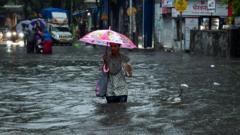Researchers reveal a troubling trend that climate change is jeopardizing blood supplies globally, with dire consequences for public health.
Climate Change Threatens Global Blood Supply

Climate Change Threatens Global Blood Supply
A new study highlights how extreme weather linked to climate change disrupts blood donations and raises demand.
Climate change is emerging as an unexpected threat to global blood supply levels. A comprehensive analysis published in The Lancet Planetary Health indicates that rising temperatures and weather extremes are negatively impacting blood donations while simultaneously increasing demand during crises.
The research conducted by Elvina Viennet, an infectious disease expert at the University of the Sunshine Coast, underscores the urgent need to address the imbalance of blood supply and demand stemming from climate-induced weather events like hurricanes, floods, and wildfires. These disruptions can prevent people from donating blood and hinder the transport and safety of blood products, endangering lives during critical moments.
The study, the first of its kind to assess climate change's effects on blood supply at a global scale, reviewed numerous investigations highlighting the impact of extreme weather on various health factors. Viennet and her team linked these findings to the blood supply network, illustrating how inclement weather can obstruct donation efforts and compromise the viability of blood transfusions when they are needed the most.
For instance, during severe weather events, potential donors may be deterred from going to donation centers due to hazardous conditions, while transport routes for blood delivery become compromised. The result is a concerning shortage of blood at precisely the times when it is essential for medical interventions.
"We must implement measures to mitigate these impacts to ensure the safety and availability of blood supplies,” asserted Viennet. As climate challenges intensify, safeguarding the future of blood donation and transfusion services becomes increasingly imperative for global health security.




















